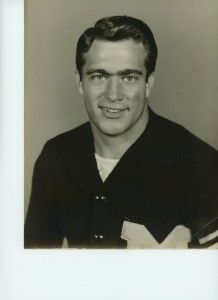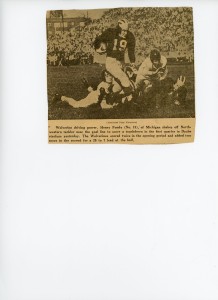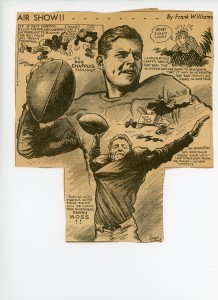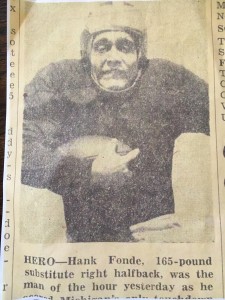BY JOEL THURTELL
The Detroit Free Press scrapped this story when I wrote it 21 years ago.
What do you think? Would you have published this story?
First, some background: He was retired in 2002, but Detroit TV weather caster Sonny Eliot’s folksy, chatty act left fond memories among many Detroit area people. I was then a Free Press reporter. I heard that the Holocaust Memorial Center in West Bloomfield planned to interview Eliot for an oral history project. Sonny Eliot was a US Army Air Forces airman shot down over Germany in World War II. He was a Jew. It seemed important for the Holocaust museum to record his story. I wanted to write a story pegged to the center’s interview. Sonny Eliot agreed to let me interview him. I wrote a story. It was not published.
Here is the story that didn’t make the Free Press:
gfbyBy JOEL THURTELLFREE PRESS STAFF WRITER Before he was a wisecracking Detroit radio and TV weatherman, Sonny Eliot was a B-24 pilot who was shot down and imprisoned by the Germans in World War II.
Eliot, the son of immigrant Jews, well knew that he could be killed if the Nazis found out his religion. So he covered up his Judaism. Because of that subterfuge, Eliot says, he learned something very disturbing about his fellow American prisoners.
By 1944, it was well known that Hitler’s people were killing millions of Jews, yet Eliot discovered that like the Germans, many of his imprisoned countrymen were prejudiced against Jews and were not upset when American Jewish fliers were rounded up, apparently to be killed.
In front of a video camera Sunday at the Holocaust Memorial Center, Eliot, 78, recounted his experiences in the nearly 15 months he spent in Stalag Luft I, the German prisoner-of-war camp where he was placed after his B-24 bomber was shot down over central Germany by German fighters on Feb. 24, 1944.
The taping session was part of an oral history project which records the experiences of people who were victims of German persecution. To date, the library has 275 Holocaust-related videotapes.
In an interview with the Free Press a few days before the videotaping, Eliot was asked what it was like to be a Jew in a German prison camp.
“Not much of a story,” said Eliot. “The only time this came up was after D-Day. They rounded up all the Jewish flyers in the camp. There must have been two, maybe 300.”
The Germans placed the Jews in a separate barracks, Eliot said, and “the rumor just ripped through the entire camp that these people would all be put on a train and taken to some place like Auschwitz.”
Eliot was not among them. The Germans believed – or at least Eliot thought they believed – his lie that the downed pilot known as Marvin Eliot Schlossberg was a Christian.
That fiction was possible because when Eliot bailed out of his burning Liberator, the sudden opening of his parachute popped his shoes off his feet and blew off his dog tags, the metal cards giving his identity, including religion.
“Even if I’d had them, I think I would have thrown the dog tags away,” Eliot said.
“I landed right in the town where we had bombed,” Eliot said. “They thanked me in their own way – they kicked my ass.”
When a German officer demanded to know his religion, Eliot answered, “Martin Luther.”
He was moved to a prison camp for aviators at Barth, a small town on the Baltic Sea. The Germans signed him in as a Protestant.
But when the Jews were moved to a separate barracks, Eliot said, “I felt, my God, my people – I’m a part of them. I’ll be brave, I’ll go, and so I talked to a Father Carlton, who was a Catholic priest captured at Dunkirk.”
“I didn’t know what to do,” Eliot said. “Should I go tell them they forgot me? Hey, I’m with those guys?”
Original text: “He looked me in the eye and said, ‘get the fuck back in the barracks and shut up. I said ‘okay,’ and that’s exactly what I did.” End original.
Re-written text per editor: The priest told Eliot to go back to his barracks and say nothing.
“That’s exactly what I did.” End re-written text.
Now all the Jews were gone but Eliot, and except for a few Americans in his room who knew the truth, he was seen as a Christian by his fellow prisoners.
With their Jewish compatriots gone, the Americans’ behavior loosened up.
“The anti-semitism which is so strange to me began to surface in small little ways, not very important, but I was aware of them in that you would hear jokes like, `They’ve got three balls up there – they’re turning the barracks into the pawn shop place.’ ”
“Not a great deal of sympathy for putting all the Jews into one barracks,” Eliot said.
There was no resistance to removal of the Jewish flyers, no expression of repugnance. “It was like a gentleman’s agreement,” said Eliot.
Meanwhile, thinking there were no Jews to hear them, Americans made caustic remarks about the Jews. “They called them `little flicks.’ ”
“Blacks are the same way. They would hear it, too. It’s not as hidden with blacks because they are immediately identified.”
“I don’t think they did it out of meanness. It’s that way still today, everywhere.”
Before the Germans could move the Jewish airmen out, Russian soldiers liberated Stalag Luft I.
Eliot went to the office and found his file.
On it, a German official had scrawled, “Jew.”
So the Germans knew.
“Somebody had turned me in.”
Here is a trail of internal newspaper staff messages about my story, starting with my photo assignment. David Crumm was the Free Press religion writer. Dennis Niemiec was a Free Press reporter. Lisa Manns was my assigning editor. Leesa Bainbridge was editor of the Free Press Oakland County newsroom and boss over both me and Lisa Manns.
At the Free Press, reporters did not make photo assignments without getting their assigning editor’s okay first to write the story. The existence of a photo request means that my story idea was approved by Lisa Manns. She placed the story on the budget, or schedule, and gave it a file name, known as a “slug”: 1SONNY19. The “1” before “SONNY” means the story was scheduled to start in the first, or state, edition, and “19” means it was to run March 19, 2002.
Messages appear most recent first, meaning that replies precede questions. We are reading backward through time and will finally arrive at the story text. Unlike other stories I’ve presented, this one has no indication of publication date, edition, or key words, all of which would mean it had made the paper.
, which this story did not.
<UB>FREE PRESS PHOTO REQUEST<RO>
<BO>Day/Date: <RO>2-9-01
<BO>Time: <RO>9:30 a.m.
<BO>Flexible? <RO>little
<BO>Will reporter be there? <RO>yes
<BO>Discussed w/ which photo editor? <RO>
<BO>Subject/phone: <RO>Sonny Elliott, (w) 248-455-7200; (h) 248-661-0046
<BO>Contact (if not subject): <RO>
<BO>Location: <RO>37412 Halstead
<BO>Directions: <RO>Lodge to Northwestern to 14 Mile to Halstead; South on Halstead; The Legends condos are on west side of Halstead, second driveway on west side 100 yards south of 14 Mile.
<BO>What is story about? <RO>Sonny Elliott, the perennial Detroit weathercaster, was an airman in World War II. Shot down over Europe, he was captured by the Germans and held as a prisoner of war. What was it like to be a Jew in a Nazi POW camp? Elliott’s story is to be videotaped Feb. 18 for the Holocaust Memorial Center’s oral history program. We are trying for an advance interview with Elliott.
<BO>Reporter/phone: <RO>Thurtell, 248-586-2609
<BO>Story editor/phone: <RO> Bainbridge, 248-586-2615
<BO>Slug: <RO> 1SONNYXX
<BO>Day/time needed: <RO>Next week
<BO>Run date: <RO>
<BO>Section/position: <RO>
Joel:
Very sorry to see such a lack of vision and understanding of these issues.
We’re talking: brain dead on this score.
— David
CRUMM 19-MAR-01,11:56
incredible!!!! I think you need to ask if you can freelance it for some other publication.
NIEMIE 19-MAR-01,11:47
The word at this point is the same — we don’t plan to run it. I take the
fall for this one. I thought he was part of a national holocaust museum
exhibit. Just telling his story that is years old doesn’t seem much of a
story or timely.
BAINBR 19-MAR-01,10:56
Leesa – Any word on my Sonny Eliot story? There are possible hooks: for
instance, I understand the Legislature may set a Holocaust Remembrance Week
to start April 19.
Joel
THURTE 19-MAR-01,10:27
Joel,
I’ll run your suggestion by Jim Finkelstein. But I don’t expect he’ll get back to us before Monday.
Leesa
<BO>BAINBR<RO> 23-FEB-01,15:04 <FO>
Joel:
They’re idiots!
If I were editing, I might suggest a couple of small tinkers with the
story. For instance, given how little of most stories we actually get “out
front” these days before a jump, I might have moved up the ‘graf in which
you picture Sonny sitting in front of the microphone — the “news peg” as
it were.
But that’s very very minor stuff.
It’s a great little story — and definitely should have been promoted
and run.
Dolts!
David
CRUMM 16-MAR-01,17:18
My note on 2-19-1:
Photo shot 1SONNY19, but per Lisa Manns, “Leesa read it and we aren’t going to run it. She’s going to talk to you about it.”
On Feb. 19, the day it was to have run, I made this note: Per Leesa Bainbridge, it’s a one source story and we normally don’t do one-source stories. She misunderstood when I pitched it and thought it was part of some national thing. It’s just this one guy’s memories, not that important, not that many people would be interested in Sonny Eliot’s experiences in World War II, even though he is famous. Doesn’t work as a news story. She will pitch it to entertainment. But I need to remove “fuck.”
<RO>
Leesa _ I can just never say die. Here goes on the Sonny Eliot story:
There is a hook for it on April 20. That is Yom HaShoah, an international day for remembering the Holocaust.
I could talk to Holocaust Center people in West Bloomfield and Washington to get more background about what happened to the Jewish prisoners; get some reaction about the experience Eliot had with Americans’ expressions of anti-Semitism and lack of sympathy for the Jews. And maybe interview Eliot again to probe more for his feelings about what happened.
What do you think? Is it a dead horse, or can I revive it?
Joel <BO>THURTE<RO> 23-FEB-01,14:51 <FO>



